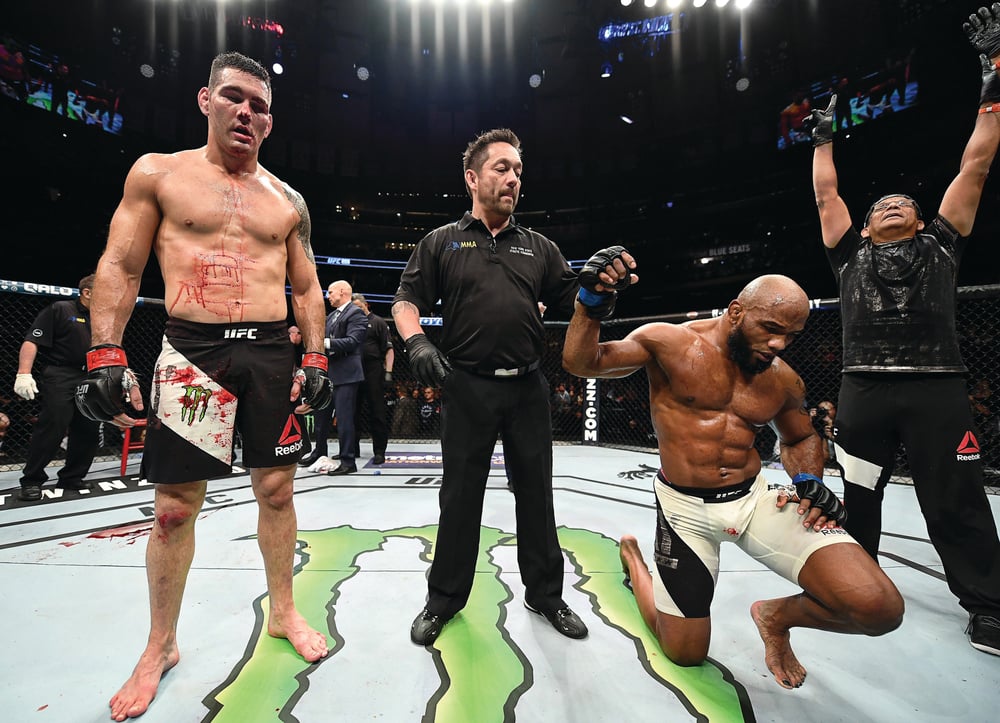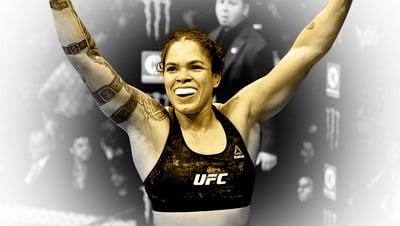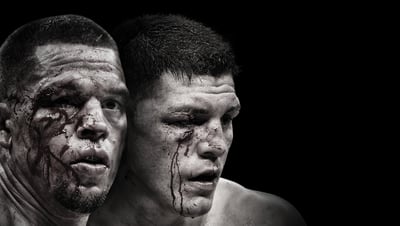
Issue 165
March 2018
Can faith in a higher power be the difference between winning and losing in MMA?
The fighter is interviewed post-barnburner. They're asked what were they thinking: did they do enough to win the fight; who's next? As the highlights are replayed and we see the action in super-low motion, so often, we hear the same response - which isn't an answer to any of those questions.
“First, I want to give thanks to God...” The combatant, drained after a bloody feud with an opponent, thanks the Almighty for guidance, the planting of fists, feet, knees and elbows in all the right places at all the right times on their vanquished opponent; for the strength in the training camp.
It seems incongruous to many, but not others. It’s a sensitive subject in many ways, and faith and belief systems for fighters work in mysterious ways. Some fighters need to a rm they do what they do with God on their side, and some don’t, even though God is in their lives.

Cuban middleweight Yoel Romero calls himself the ‘Soldier of God’. Holly Holm is possibly better known by her nickname ‘The Preacher’s Daughter’. Roger, her father, is indeed a Church of Christ preacher. Former UFC 205lb champion Jon Jones is the son of a minister and has “Philippians 4:13” tattooed on the right side of his chest, which reads, “I can do all this through him who gives me strength.”
Mirror that against Bones' litany of drug busts and calamities, and it seems bizarre. Yet belief in God is intangible, unquestionable for some, regardless of the surrounding issues.
Perhaps it all hinges on the individual's relationship with a higher power? Belief is an extraordinary thing for fighters, as is faith. They say fight sports are 90% mental and 10% physical. If you believe God is your side, or even watching over you, it appears to be a kind of advantage, at least for that individual.
It underpins the lives of so many fighters, and we often see MMA exponents who espouse their faith in God and belief that has sustained them and hopefully, they feel, has kept them and their opponent from suffering serious harm in an inherently dangerous sport.
Perhaps the faith has to be there because fighters need faith in themselves, given that they walk a fine line in one of the most unusual occupations imaginable. MMA is arguably a calling., like a call to the priesthood, for example.
There are fighters who have no religious belief, of course, and a clutch of fighters contacted during interviews for this article thought they could add nothing to the debate. Religion just isn’t part of their lives, just as some fighters, like Romero, like Jones, or even Michael McDonald use their fighting profile to proselytize their beliefs, seeing it as an evangelizing process, a part of their lives which is as intrinsic as getting on the speedball, or rolling on the mat.
For them, it is simply a way of life, or for others, an antidote to the violent work they are involved in day in, day out; a way of pairing and justifying the dark underbelly of fight sports.

There are other fighters, tongue-in-cheek or not, who declare, ‘I am God’. Yes, you are all mouthing Conor McGregor right now. But again, it is a kind of self-belief, credence needed for the super-ego just in order to fight.
Former fighter-turned-trainer Dean Amasinger takes a different view. The perception that faith is so important in MMA could be because of geographical reasons, contests the Englishman.
“My rational side says the reason there are so many fighters that profess their faith is because of where most come from,” he says. “Brazil and America are two of the most religious countries in the world. Brazil is a deeply Catholic country and many fighters from America come from the Bible Belt, so they’re going to be a product of their environment. Conversely, I can’t remember a Scandinavian fighter ever thanking God for the same reason, as Scandinavians are largely atheist.”
Yet we would all agree it takes great belief to be a fighter. The other side of that, perhaps, is accepting the will of God – a loss or an injury, as much as a victory or
a knockout – and so we often hear things “happen for a reason”.
Saul Rogers, another British fighter, used this exact phrase with me recently and reckons it may be a coping mechanism.
“I think fighters have such a deep faith because they prefer to put their faith in a higher power as it will alleviate some of the mental stresses they deal with in the fight game, and in life. If they believe something, or someone is guiding them through their journey, the outcome is already pre-ordained, which again eases the mind no matter what the situation – good or bad.”
Javier Mendez, head coach at American Kickboxing Academy in San Jose, has fighters around him who espouse religion – Daniel Cormier for one, and Khabib Nurmagomedov another, a Muslim who prays at the gym a couple of times a day. He still has mixed views, but recognizes the role it plays for many in preparing
athletes for competition – above and beyond what he can provide in the gym.
“I’m not sure that many fighters are that religious, but it might be the fact that they are in a dangerous sport and if something goes wrong, they might want to have God looking over them to keep them safe,” he suggests.
Brandon Gibson, striking coach at Jackson-Wink MMA in Albuquerque, New Mexico, works with both Jones and Holm. He sees many fighters who are carried by their faith and suggests connecting with it is a prerequisite to facing o against an opponent. The strong are made stronger.
“Jon Jones, for instance, covers his locker room in biblical quotes, and says a group prayer with his team before he walks out,”
he explains. “Fighting can be a nerve-shaking process, and I believe so many
fighters use their faith to strengthen their hearts and minds.
“I think you see mixed martial artists, boxers and, to an even broader extent, police officers and soldiers use their faith to strengthen their nerves, and remind themselves that a greater power is with them before heading into a competition or battle.”
So, how do sports psychologists see this? Brian McCready, a sports psychologist and fighter life coach from Liverpool, England, believes the nature of a mixed martial artist’s profession may actually heighten their relationship with the person upstairs.
He explains: “I think fighters may have a deep faith in God through fear, possibly because they’re aware of the fact – more so than most people – that they could actually die when they go to the office, so to speak. They have been made more consciously aware of their mortality.
“If you are in that state of mind it might be a good idea to keep in touch with the only thing you feel can keep you safe.”
In other words, a belief that your life, walking a tightrope as a fighter, is affected by a higher force. But does that mean it is simply another way of espousing one’s self-belief or spirit?

Mike Brown, former elite fighter turned coach, believes it is “an interesting question” and agrees with McCready. He also suggests that even non-believers experience something similar, though connections that are far more tangible.
“I think fighting is very primitive and athletes become very emotional. When you enter a fight, the potential for serious injury is very high and naturally, the athlete goes into ‘ fight or fight’ mode. Under this type of extreme stress, the body releases a number of hormones including large amounts of adrenaline. This is powerful stuff. With hormones racing to the max, fighters or athletes are going to feel more in touch with their spiritual sides.
“Depending on what country or region of the world they were brought up in will determine which God or higher power they give praise. Some secular athletes will feel an extreme, deep connection to family, teammates, coaches, and friends.”
David Mullins, a sports psychology consultant in the combat arena is agnostic, but has worked with a number of fighters who have had strong faith in God. Though he respected their beliefs, he was initially concerned that they may have been detrimental. Conversely, he discovered that there were evident benefits.
“One of the potential issues was the idea that ‘God has a plan for me’, which in terms of fight preparation, I was worried could have meant less personal responsibility for the fighters,” he says.
“However, I found that the work ethic and prep was the same as any other fighter, so no issues there. In contrast, I found the faith to be almost useful in terms of managing the emotions leading up to a fight. It kind of takes some of the negative pressure o for the lads as they were just focused on doing their best performance and not as concerned with the consequences.
“That’s where I want all fighters to be so the faith made it a little easier maybe to get there.” Psychologist McCready also subscribes to the view that some fighters may feel a ‘calling’, and can affect the level of both their faith, and relationship with God, in whatever higher force they perceive God to be.
“There can be the powerful belief that they were chosen to be a fighter which is a massively positive placebo,” he says. “That can take the average fighter to a greater stage. Prayer and faith work. Also, it’s essentially an affirmation, as the most famous of all fighters constantly affirmed ‘I am the greatest’. Muhammad Ali said so many times (and in his eyes) his God chose him to be...”
That resonates in the case of Jessica Eye, trained at Cleveland’s Strong Style gym by Marcus Marinelli, the man who guided Stipe Miocic to UFC heavyweight gold.
‘Evil’ had no tendency towards Christianity when she first pulled on a pair of 4oz gloves, but working alongside others who already faith in God saw the torch passed on. An inspirational woman who has faced serious adversity in her life, has found faith in her gym, through her coach.
“I wasn’t raised in a religious family,” Eye explains. “I found my faith later through my coach, Marcus. He educated me on faith and it wasn’t realized until life really threw me down and held me there. The only way out was faith in God, and I have found a more positive me in my faith. Most recently, my coach bought me a rosary that means the world to me. Faith is hard to find when you don’t believe. Once you believe your life grows, and so does the faith.”
For some, religion is simply part of who they are. It’s always been a big part of their lives. It’s given them strength in life as well as in fights and they’d say their prayers whether stepping into a cage was their career or not.
Kelvin Gastelum grew up in a religious household, so for him, it was the norm. “My mum has always been a big believer, so I kind of grew up in church,” he says. “I’m glad. It taught me a lot about myself and about morals. I give glory to God and I pray before every single fight.
“Right before they call my name – right before they say you’ve got two minutes,
I say, ‘Right guys, it’s time.’ We pray and go out there. It’s one of the staples of who
I am and why I do what I do. I feel like things happen for a reason. Whether I win or lose, it happens for a reason.”

Yet some do take it very seriously indeed. Bellator bantamweight Michael McDonald found his faith was a powerful aid during long periods out on the sidelines through hand surgeries. He felt God was guiding him, and that he would be back. ‘Mayday’ takes an earnest attitude in his relationship with religious faith.
He says: “In my relationship with Christ, I have found him comforting me and talking to me, teaching me, organizing things around me, but also blessing me with a fantastic marriage and a fantastic support network of people around us.”
McDonald reveals when his fights were inconsistent, events happen which he believes are of God’s making. Bills were paid by friends, food was supplied to his training camp by a restaurant when his wife was forced to work more, when the future looked bleak.
“That was years ago. But these are just examples of the way God has provided for us and sent people our way to comfort us personally and teach us how to go about these things.
“You listen to Stone Cold Steve Austin and he’ll say his success and his life was just a lucky fluke. My life would be the most unlikely fluke in the world, but
I know it’s not. I know there is a design behind it. I pray and thank God for that.”
Belief systems should be respected. Faith in God and religious doctrine can divide the fighting world, as it does society. But there is good reason why so many fighters do this: some of it is cultural, some of it is upbringing and other times it is simply because a relationship with God, according to some trainers, psychologists and indeed fighters themselves, is what pulls them through this messy, often violent business which makes winners of losers, generates an industry, keeps the wilder sections of society fulfilled and entertains fans.
Noad Lahat, who has seen active duty in the Israeli army, has several points on the issue of God and fighters. “It’s annoying on the one hand that fighters thank God after a fight. I mean – keep it to yourself.
I hate it when they thank their God right after beating someone’s face up. But I think most fighters come from working-class families with a strong background in religion.
“But to be a good fighter you need a lot of self-belief and for many, it comes hand and hand with a belief in something bigger. Look, it’s f**king scary to get in the cage (not for me of course) in front of everyone you know, so you pray to God for help and right after the fight when all the pressure is over, you thank whatever helped you go through it.” It makes sense. And for some, that help comes from on high.
There is no proof, however, that anyone has an advantage, because of God, Allah, Buddha or any other proclaimed deity. Sports psychologist Mullins reminds us that it’s possible to get there without any faith. Many fighters have done many times. He also states religious rules, such as diet restrictions or rest days, can obviously have an effect, though they can also be overcome.
“At the end of the day, it’s still about the work being put in by the fighter and their ability to perform when it counts,” he says. “There have been legendary fighters with strong faith and no faith so, for me, really it’s not an advantage or disadvantage.”
One of MMA’s most outspoken thinkers. Chael Sonnen offers a typically pithy response: “I’m Catholic, but I’d never be rude enough to act as though God didn’t have better things to do than lend a hand in a border-line illegal cage fight.”
And it’s this take that might have the greatest impact on the debate. After all, there was no divine intervention to prevent ‘The American Gangster’ from being submitted by Tito Ortiz, Anderson Silva or any of his other conquerors throughout his career.
Or maybe it was all part of God’s plan...
...









